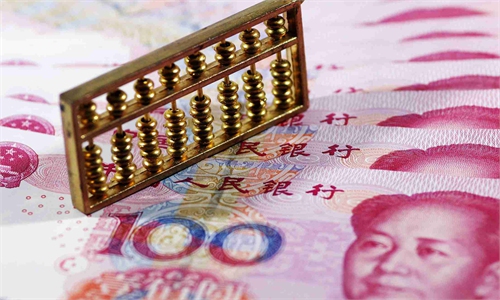
Illustration: Liu Xiangya/GT
The central parity rate of the yuan was reported at 7.1966 against the US dollar on Thursday, an increase of 25 basis points compared with Wednesday, according to the China Foreign Exchange Trade System (CFETS). The rebound came after declines in recent days, as some Western institutions and media outlets rushed to hype "bearish speculation."Against a strengthening US dollar, the exchange rates of major non-US currencies such as the yen, euro and pound have all been declining recently. But the yuan has remained basically stable against a basket of currencies so far this month after strengthening in October, according to the CFETS.
To provide a more accurate analytical perspective on the currency, it is necessary to consider the fluctuations of the yuan against the US dollar, as well as against other major currencies. Despite uncertainties and shocks from market fluctuations, the yuan remains one of the most stable currencies globally.
Short-term two-way fluctuations of the yuan are normal. The stable medium- to long-term trend of the currency's exchange rate is supported by China's solid economic fundamentals. The continuous improvement of the Chinese economy will continue to boost international investors' confidence in yuan-denominated assets.
Since late September, a package of policies to stabilize growth has been implemented, and more positive signals have emerged in the Chinese economy, with market expectations showing significant improvement.
As more policies continue to take effect, the Chinese economy will receive further support and stabilize in a positive direction. China's international balance of payments is expected to remain balanced, and the exchange rate will remain stable.
The current account is an important indicator reflecting whether a country's internal and external economies are balanced.
As the world's second-largest economy, China has managed steady economic growth, with resilient foreign trade and orderly two-way cross-border capital flows.
In the first three quarters of this year, the current account surplus was 1.713 trillion yuan ($237 billion), equivalent to 1.8 percent of the period's GDP, remaining within a reasonable and balanced range. The overall cross-border capital flow in both directions has been stable and orderly.
In addition, China's foreign exchange reserves remain above $3.2 trillion, ranking first in the world, providing a solid foundation for a stable yuan exchange rate.
The international economic and trade environment faces many uncertainties. However, China has sufficient capacity to maintain stable growth in its economy and trade, and to promote the optimization and upgrading of its economic structure, which can provide solid support for the stability of the yuan's exchange rate.
The People's Bank of China's monetary policy implementation report for the third quarter of 2024 clearly stated that the next steps will involve enhancing the monitoring and analysis of cross-border capital flows, and strengthening expectation management to maintain the basic stability of the Chinese yuan's exchange rate at a reasonable and balanced level.
China will continue to respond to external uncertainties by expanding openness, reforming trade liberalization and facilitation, and improving its export structure.
China's exports will continue to play a fundamental role in stabilizing cross-border capital flows.
Meanwhile, China is promoting the implementation of various supportive economic policies, significantly enhancing the attractiveness of yuan-denominated assets to foreign capital and providing strong support for foreign exchange reserves.
In turn, a stable yuan exchange rate can contribute positively to China's economic improvement by fostering a predictable environment for trade and investment, supporting domestic consumption and enhancing the effectiveness of monetary policy.
In this sense, it is unreasonable to blindly exaggerate the risks associated with the recent decline of the yuan against the US dollar and the potential impact on the Chinese economy. Such speculation fails to recognize the strong resilience of the Chinese yuan and economy.
The author is a reporter with the Global Times. bizopinion@globaltimes.com.cn



